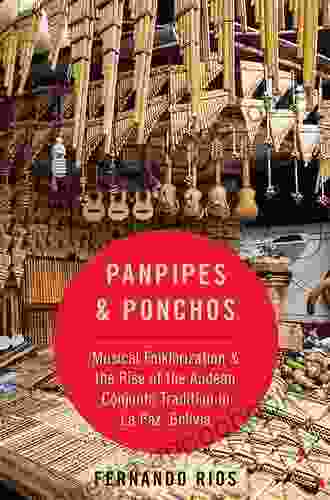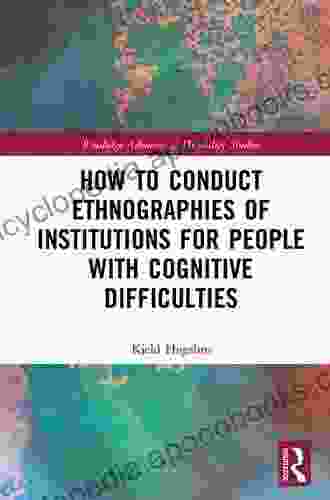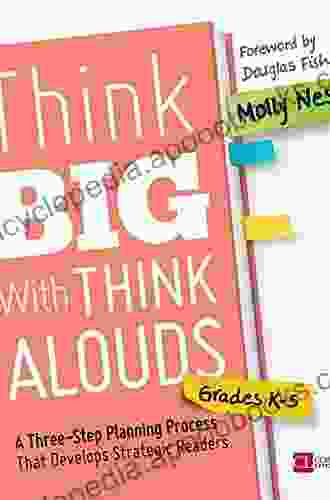How to Conduct Ethnographies of Institutions for People with Cognitive Disabilities: A Comprehensive Guide

Embark on a journey to unravel the intricate tapestry of institutions that shape the lives of individuals with cognitive disabilities. This comprehensive guide illuminates the path towards conducting rigorous and insightful ethnographies, empowering researchers with the knowledge and tools to capture the lived experiences and perspectives of this often-overlooked population.
4 out of 5
| Language | : | English |
| File size | : | 3779 KB |
| Text-to-Speech | : | Enabled |
| Screen Reader | : | Supported |
| Enhanced typesetting | : | Enabled |
| Word Wise | : | Enabled |
| Print length | : | 221 pages |
Navigating the Ethical Maze: Considerations for Researchers
Entering the field of institutional ethnography demands a profound respect for the vulnerability and dignity of the participants. This section provides an in-depth examination of ethical considerations:
- Informed Consent and Participant Autonomy: Ensuring that individuals fully understand the nature of the research and have the capacity to provide meaningful consent.
- Confidentiality and Privacy: Protecting the identities and personal information of participants while maintaining the integrity of the research findings.
- Vulnerability and Power Dynamics: Recognizing the inherent power imbalances between researchers and participants and minimizing potential harm or exploitation.
- Respect for Diversity: Valuing and embracing the unique experiences and perspectives of individuals from various backgrounds and abilities.
Gaining Entry and Developing Rapport: Building Bridges to the Field
Establishing rapport and trust with participants is the cornerstone of successful ethnographic research. This section outlines strategies for:
- Building Relationships: Engaging with gatekeepers, community leaders, and participants to foster genuine connections.
- Participatory Research: Involving participants in the research process to enhance understanding and ensure their voices are heard.
- Cultural Sensitivity: Adapting research methods to the cultural norms and communication styles of participants.
- Language and Communication: Employing assistive technologies, interpreters, and other tools to overcome language barriers and promote accessibility.
Observational Techniques: Capturing the Nuances of Institutional Life
Observational methods provide a window into the daily routines and interactions within institutions. This section explores techniques for:
- Participant Observation: Immersing oneself in the setting to observe firsthand the behaviors, interactions, and organizational structures.
- Field Notes: Recording detailed observations, reflections, and interpretations to document the complexities of institutional life.
- Audio and Video Recordings: Capturing rich data on verbal and non-verbal communication, interactions, and environmental cues.
- Ethnographic Mapping: Creating visual representations of physical spaces, social networks, and power dynamics within the institution.
Interviewing Participants: Uncovering Hidden Voices and Perspectives
Interviews provide an opportunity to delve deeper into the experiences and perspectives of individual participants. This section explores:
- Types of Interviews: Structured, semi-structured, and unstructured interviews tailored to the research questions and participant abilities.
- Interview Techniques: Active listening, open-ended questions, and cultural sensitivity to ensure meaningful conversations.
- Accessibility and Accommodations: Providing assistive technologies, interpreters, and other accommodations to promote participation and inclusivity.
- Data Analysis: Systematically coding and analyzing interview data to identify patterns, themes, and insights.
Data Analysis and Interpretation: Unlocking the Meaning of Institutional Ethnographies
The final stage of ethnographic research involves the analysis and interpretation of data. This section covers:
- Inductive and Deductive Analysis: Combining theoretical frameworks with grounded approaches to identify patterns and develop theories.
- Discourse Analysis: Examining the language, narratives, and power dynamics within institutional settings.
- Reflexivity: Critically examining the researcher's own biases and experiences to ensure客观性.
- Reporting Findings: Disseminating research findings through academic publications, conference presentations, and other accessible formats.
: Advancing Knowledge and Empowering Advocacy
Through this comprehensive guide, researchers are equipped with the tools and insights to conduct rigorous and impactful ethnographies of institutions for individuals with cognitive disabilities. By unraveling the complexities of these settings, researchers can shed light on the experiences and perspectives of this often-marginalized population.
The knowledge gained from these ethnographies can inform policy, improve service provision, and empower advocates to create more inclusive and responsive institutions that truly support the well-being of individuals with cognitive disabilities.

References:
- Charmaz, K. (2006). Constructing grounded theory: A practical guide through qualitative analysis. Sage.
- Emerson, R. M., Fretz, R. I., & Shaw, L. L. (1995). Writing ethnographic fieldnotes. University of Chicago Press.
- Hammersley, M., & Atkinson, P. (2007). Ethnography: Principles in practice. Routledge.
- Miles, M. B., Huberman, A. M., & Saldaña, J. (2014). Qualitative data analysis: A methods sourcebook. Sage.
4 out of 5
| Language | : | English |
| File size | : | 3779 KB |
| Text-to-Speech | : | Enabled |
| Screen Reader | : | Supported |
| Enhanced typesetting | : | Enabled |
| Word Wise | : | Enabled |
| Print length | : | 221 pages |
Do you want to contribute by writing guest posts on this blog?
Please contact us and send us a resume of previous articles that you have written.
 Book
Book Novel
Novel Page
Page Chapter
Chapter Text
Text Story
Story Genre
Genre Reader
Reader Library
Library Paperback
Paperback E-book
E-book Magazine
Magazine Newspaper
Newspaper Paragraph
Paragraph Sentence
Sentence Bookmark
Bookmark Shelf
Shelf Glossary
Glossary Bibliography
Bibliography Foreword
Foreword Preface
Preface Synopsis
Synopsis Annotation
Annotation Footnote
Footnote Manuscript
Manuscript Scroll
Scroll Codex
Codex Tome
Tome Bestseller
Bestseller Classics
Classics Library card
Library card Narrative
Narrative Biography
Biography Autobiography
Autobiography Memoir
Memoir Reference
Reference Encyclopedia
Encyclopedia Michael R G Spiller
Michael R G Spiller Mimi Zollars
Mimi Zollars Sheila Clark Edmands
Sheila Clark Edmands Joseph S Walker
Joseph S Walker Adrian Rogers
Adrian Rogers John Mair
John Mair Adam Beck
Adam Beck Steve Lodder
Steve Lodder Stephanie L Mudge
Stephanie L Mudge Tiaraha Stewart
Tiaraha Stewart Sherry A Burton
Sherry A Burton A J Wills
A J Wills Satit Soranastaporn
Satit Soranastaporn Mike Loades
Mike Loades Jolin White
Jolin White Leif Wenar
Leif Wenar Collette O Mahony
Collette O Mahony Ian Christe
Ian Christe Desmond Meade
Desmond Meade Kurt James
Kurt James
Light bulbAdvertise smarter! Our strategic ad space ensures maximum exposure. Reserve your spot today!

 Colin FosterUnlocking the Enigma of Self-Control: A Journey Through the Animal Kingdom...
Colin FosterUnlocking the Enigma of Self-Control: A Journey Through the Animal Kingdom...
 Mason PowellMusical Folklorization and the Rise of the Andean Conjunto Tradition in La...
Mason PowellMusical Folklorization and the Rise of the Andean Conjunto Tradition in La... Dennis HayesFollow ·5k
Dennis HayesFollow ·5k Cole PowellFollow ·18.5k
Cole PowellFollow ·18.5k Jamison CoxFollow ·17k
Jamison CoxFollow ·17k Cormac McCarthyFollow ·13.5k
Cormac McCarthyFollow ·13.5k Aaron BrooksFollow ·4.2k
Aaron BrooksFollow ·4.2k Mario SimmonsFollow ·2k
Mario SimmonsFollow ·2k William ShakespeareFollow ·14.9k
William ShakespeareFollow ·14.9k Aldous HuxleyFollow ·11k
Aldous HuxleyFollow ·11k

 Jacob Hayes
Jacob HayesUnlock the Power of Microsoft Word: A Comprehensive Guide...
Microsoft Word is a widely used word...

 Hunter Mitchell
Hunter MitchellAndrea Carter and the Price of Truth: A Thrilling...
Get ready for an unforgettable...

 Ivan Turner
Ivan TurnerTrading Jeff and His Dog: An Unforgettable Adventure of...
Get ready for an emotional rollercoaster...

 Langston Hughes
Langston HughesGo Viral TikTok: The Ultimate Guide to Gaining 100K...
TikTok has emerged as a social...

 Ibrahim Blair
Ibrahim BlairUnveil the Enchanting Realm of Short Fiction: Dive into...
Delve into a Literary Tapestry of...

 Tennessee Williams
Tennessee WilliamsUnveil the Enchanting World of Elizabeth Barrett...
A Poetic Tapestry of Love, Loss, and...
4 out of 5
| Language | : | English |
| File size | : | 3779 KB |
| Text-to-Speech | : | Enabled |
| Screen Reader | : | Supported |
| Enhanced typesetting | : | Enabled |
| Word Wise | : | Enabled |
| Print length | : | 221 pages |








